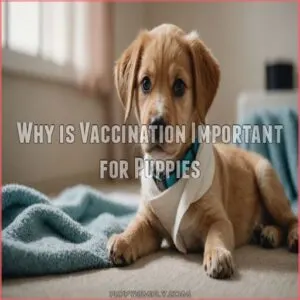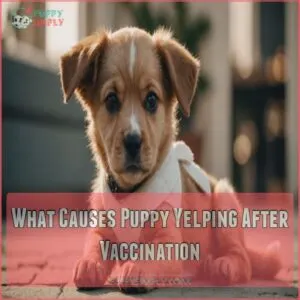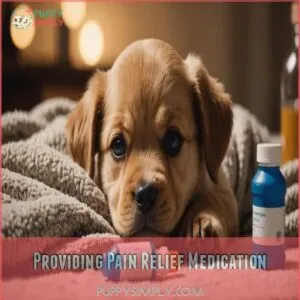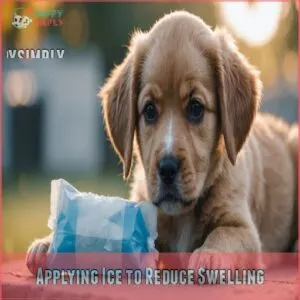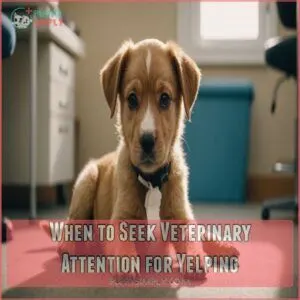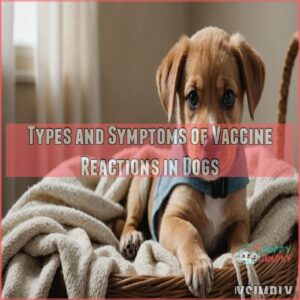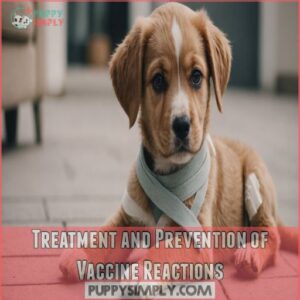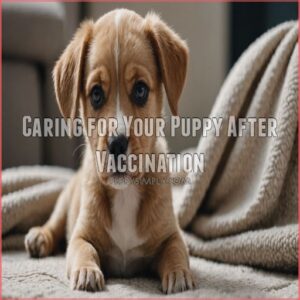This site is supported by our readers. We may earn a commission, at no cost to you, if you purchase through links.
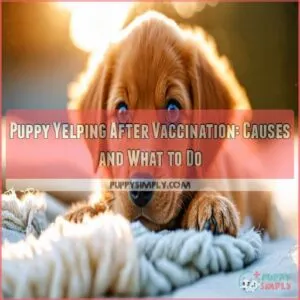 Your puppy yelping after vaccination isn’t uncommon, and there’s no need to worry.
Your puppy yelping after vaccination isn’t uncommon, and there’s no need to worry.
That tiny needle can cause temporary discomfort, leading to some yelps or whimpers.
Think of it like us getting a shot—a bit of tenderness and confusion is normal.
Make sure to watch for other signs like swelling or lethargy, which usually clear up on their own.
If your pup keeps yelping beyond 48 hours, it’s a good idea to call your vet.
Remember, cuddles and gentle words work wonders, and your brave little buddy will bounce back in no time.
Ready to learn what else can help?
Table Of Contents
- Key Takeaways
- Why is Vaccination Important for Puppies
- What Causes Puppy Yelping After Vaccination
- Common Side Effects of Puppy Vaccination
- Managing and Soothing a Yelping Puppy
- When to Seek Veterinary Attention for Yelping
- Types and Symptoms of Vaccine Reactions in Dogs
- Treatment and Prevention of Vaccine Reactions
- Caring for Your Puppy After Vaccination
- Frequently Asked Questions (FAQs)
- Is it normal for my puppy to be in pain after shots?
- Why is my dog yelping after the vaccine?
- How do you comfort a puppy after shots?
- Why does my puppy have a painful lump after vaccination?
- How long should I monitor my puppy post-vaccination?
- Can a puppys environment affect vaccination reactions?
- Are there alternatives to vaccines for puppies?
- How to comfort a puppy afraid of vet visits?
- What to do if vaccines are missed?
- Conclusion
Key Takeaways
- Some yelping after vaccination is normal, lasting only a short time.
- Monitor your puppy for 48 hours for unusual symptoms like swelling or lethargy; contact your vet if concerned.
- Provide comfort and reassurance with gentle handling, ice, and possibly vet-recommended pain relief.
- Serious reactions like difficulty breathing or persistent vomiting require immediate veterinary attention.
Why is Vaccination Important for Puppies
Vaccinating your puppy is absolutely essential because it safeguards them from serious and potentially fatal diseases like rabies and parvovirus.
A balanced diet rich in essential nutrients like puppy immune superfoods helps support a puppy’s developing immune system. Vaccinations help build strong immunity as your puppy’s immune system develops, ensuring they grow into healthy and happy adults.
Protecting Against Fatal Diseases
Vaccinating your puppy is like giving them a superhero shield against dangerous foes like rabies and parvovirus.
These vaccines form part of a vital puppy vaccination schedule.
While core vaccines are essential, non-core ones depend on lifestyle and location.
Most pups experience mild reactions like puppy yelping after shots, but in some cases, severe reactions can happen.
The risk versus reward is clear: protecting your pup from fatal diseases outweighs the small discomfort of puppy yelping after shots.
Discuss any concerns about vaccine efficacy or puppy vaccination side effects with your vet to make sure your furry friend’s safety.
Building Immunity in Developing Dogs
Those tiny teeth and wobbly legs? They’re also a brand-new immune system.
Puppy vaccination is key to building that system’s defenses.
Think of it like training your puppy’s bodyguards.
Early vaccination, following your vet’s recommended vaccine schedules, primes their defenses against serious illnesses.
To make sure your puppy stays safe and healthy after vaccination, consider investing in products designed for puppy post-vaccination care.
Colostrum benefits kickstart this process, but vaccines provide ongoing, targeted protection.
A strong puppy immune system means fewer worries about puppy vaccination complications and vaccine reactions in dogs.
It’s a win-win for both of you!
What Causes Puppy Yelping After Vaccination
After a vaccination, your puppy might yelp due to the pain of the injection and the unfamiliar discomfort it causes.
It’s natural for them to feel confused and seek your comfort, as they’re adjusting to this new experience.
Pain From The Injection
Puppy yelping after a vaccination can tug at your heartstrings and often stems from the needle pricking their sensitive skin.
It’s common and typically short-lived.
Here’s how to help:
- Apply a cold compress to soothe the area.
- Consider vet-approved pain relief options.
- Gently rub the injection site for comfort.
- Keep an eye on yelping duration to track recovery.
- Encourage rest to allow natural healing.
These steps offer compassion and care for vaccination reactions in puppies.
Feeling Uncomfortable and Confused
Just like the sting of a shot can make a puppy yelp, the confusion afterward might leave them feeling a bit off.
Your puppy might be confused and jittery due to the new sensations their body experiences.
Engage in calming techniques to ease puppy anxiety.
Offer gentle reassurance with cuddles and a cozy spot to rest.
Notice any behavior changes, like puppy lethargy or shaking, using stress relief methods to comfort them after their shots.
Common Side Effects of Puppy Vaccination
After your puppy’s vaccination, you might notice some common side effects like swelling and pain at the injection site, or even a bit of lethargy.
Although these symptoms can be unsettling, they’re usually mild and resolve quickly, ensuring your puppy’s healthy future.
Swelling and Pain at Injection Site
Yelping might signal discomfort from the injection itself.
Your puppy’s body can react with swelling and pain at the vaccination site.
To ease this, gently apply an ice pack for relief.
Explore natural remedies or simple methods like rest to soothe your furry friend.
Prioritize post-injection care to maintain vaccination safety and maintain your puppy’s health, sparing them unnecessary distress.
Lethargy and Reduced Physical Activity
Swelling and pain might follow vaccinations, making your puppy sluggish. It’s normal for your furry friend to show signs of lethargy and reduced activity.
Here’s what to keep an eye on:
- Allow lots of rest.
- Limit playtime to gentle activities.
- Observe behavior changes.
- Compare energy levels to usual days.
- Make sure your puppy stays hydrated and comfortable.
If lethargy persists, consult your vet.
Mild Fever and Shivering
A slight fever and shivering are common after puppy vaccinations.
Don’t worry; it’s usually a temporary reaction.
Your pup’s body’s just fighting off the vaccine’s effects.
Monitor their temperature; a slightly elevated temperature for a day or two is normal.
If it lasts longer or they seem unwell, contact your vet.
Plenty of rest and warmth will help.
Remember, prevention is key!
Always discuss vaccine types and risks with your vet.
Sneezing and Runny Nose in Some Breeds
While mild fever may leave your pup a bit shivery, some breeds experience sneezing and a runny nose after vaccination.
This nasal discharge is usually harmless, stemming from breed-specific reactions or vaccine ingredients.
Keep an eye on allergy concerns by providing gentle post-vaccination care.
If symptoms persist, consult your vet about potential hypersensitivity reactions and non-allergic vaccine reactions.
Managing and Soothing a Yelping Puppy
When your puppy is yelping after a vaccination, it’s important to handle them with care and provide comfort.
You can offer pain relief as advised by a vet.
Apply ice to reduce swelling.
And reassure your little friend with gentle affection.
Handling With Care
After shots, pups might yelp due to tenderness.
Handle your puppy gently; don’t press on the injection site.
Create a cozy spot for rest and reassurance.
Use calming voices and gentle strokes to soothe.
Engaging them with soft toys can distract and comfort.
With patience and care, you’ll soon see your puppy’s wagging tail return.
Providing Pain Relief Medication
Handling a yelping puppy with care helps, but sometimes you need a bit more.
Consider pain relief options.
Over-the-counter meds might be suitable, but always check with your vet for safe choices and dosage guidelines.
Be aware of side effects and watch for reactions.
A vet consultation makes sure your puppy’s comfort and keeps things running smoothly.
Applying Ice to Reduce Swelling
Grab an ice pack to gently apply on your puppy’s injection site.
Keep it there for about 10 minutes, repeating as needed over several hours.
This reduces the swelling and offers some cold therapy benefits.
If ice isn’t handy, a cool, damp cloth works too.
Keep an eye on swelling duration; it should ease within a day.
Offering Comfort and Reassurance
Once you’ve cooled the area with ice, focus on comforting your puppy.
Use gentle handling to minimize puppy anxiety and employ calming techniques like soft talking.
Positive reinforcement with treats can encourage calm behavior.
Your emotional support, through cuddles and calm presence, reassures your pup, making the recovery more pleasant and helping to ease any lingering discomfort from the vaccination.
When to Seek Veterinary Attention for Yelping
While some yelping is normal after vaccinations, you should contact your vet immediately if you notice anything unusual like swelling, difficulty breathing, or persistent vomiting.
These could signal a serious problem needing prompt attention.
Don’t hesitate to reach out – it’s always better to be safe than sorry regarding your furry friend’s health.
Monitoring for Serious Complications
You’ve managed the yelping, but recognizing when it’s time to act is key.
Monitor your puppy post-vaccination for any odd symptoms.
If your pup is especially anxious, consider using calming treats to help ease their stress.
Noticed persistent crying, swelling, or lethargy after a day or two?
It might be time to check in with your vet.
Identifying these early signs helps prevent further issues and makes sure your pup stays safe and healthy.
Identifying Signs of Allergic Reactions
Always keep an eye out for signs showing your puppy might’ve an allergic reaction to a vaccine.
Look for symptoms like facial swelling, hives, or vomiting.
Difficulty breathing and sudden collapse are concerning signs.
Imagine your puppy’s discomfort as they yelp, signaling it’s time for a vet visit.
Quick action can make a world of difference!
Recognizing Rare but Life-Threatening Symptoms
Spotting serious symptoms in your puppy after a vaccination is like reading a mystery novel. If you see any signs of unusual behavior such as your dog acting drunk and wobbly Drunk and Wobbly Behavior, which could be indicative of an underlying condition that needs prompt veterinary attention.
- Facial Swelling
- Breathing Difficulty
- Collapse or fainting
- Persistent skin rashes
- Anaphylaxis signs
head to the vet immediately. These clues aren’t part of the usual post-shot story and need professional attention to protect your furry friend’s safety.
Types and Symptoms of Vaccine Reactions in Dogs
When your puppy yelps after a vaccination, it’s important to recognize the different types of vaccine reactions they might experience.
Non-allergic reactions cause mild symptoms like pain or swelling.
While hypersensitivity and anaphylaxis can lead to more serious signs such as vomiting and facial swelling.
Non-Allergic Reactions
Your puppy’s non-allergic reaction to a vaccine might include swelling, mild pain, or lethargy.
These common symptoms typically fade within a few days.
For injection site care, apply a cold pack occasionally.
If discomfort persists, consult your vet for treatment options.
Remember, they’re temporary.
| Symptom | Duration |
|---|---|
| Swelling | 1-3 days |
| Mild Pain | 1-2 days |
| Lethargy | 1-2 days |
| Treatment Needed | Rarely |
Hypersensitivity Reactions
Unlike non-allergic reactions, hypersensitivity reactions involve your puppy’s immune system going into overdrive.
- Facial swelling or hives
- Vomiting episodes
- Noticeable lethargy
- Persistent itching
Hypersensitivity triggers, like certain vaccine components, can lead to these symptoms.
Discuss treatment options and prevention strategies with your vet to minimize long-term effects and protect your puppy’s safety.
Anaphylaxis Reactions
More serious than hypersensitivity is anaphylaxis, a life-threatening allergic reaction.
Anaphylaxis symptoms include collapse, pale gums, and breathing trouble.
It’s rare, but knowing the signs is key.
Anaphylaxis treatment needs immediate vet attention; it’s a race against time.
Anaphylaxis prevention isn’t foolproof, but careful monitoring helps.
While anaphylaxis risks are low, being prepared is essential for your pup’s safety.
Treatment and Prevention of Vaccine Reactions
When your puppy struggles with a vaccine reaction, it’s important to act promptly to ease their discomfort.
Using antihistamines or steroids for hypersensitivity and spacing out injections can greatly help reduce adverse reactions in high-risk puppies.
Antihistamines and Steroids for Hypersensitivity
After understanding vaccine reactions, focus on treating hypersensitivity with antihistamines and steroids.
These medications help manage allergies by reducing inflammation and side effects.
Your vet will guide you on dosage and treatment options.
If your pup is also experiencing signs of atopy, consider a dog allergy test to identify common allergens and plan a customized treatment approach.
Remember, each pup reacts differently, so watch for any long-term effects.
This approach can soothe your pet’s discomfort and restore their wagging tail.
Pre-Treatment for High-Risk Dogs
Before vaccinations, consider these pre-treatment options to help high-risk dogs.
Discuss risk factors with your vet.
It’s important to know your dog’s allergy history to tailor care.
During your vet consultation, get informed consent for any pre-treatment measures.
Here are steps to take:
- Identify risk factors.
- Review allergy history.
- Consult your vet.
- Get informed consent.
Separating Injections to Reduce Adverse Reactions
To lessen adverse reactions, consider spacing out your puppy’s vaccines.
This approach, known as separating injections, aids in managing risks tied to multi-dose vaccines.
A customized vaccine schedule addresses individual needs and considers dog breed factors.
Always prioritize a vet consultation.
Here’s a quick guide:
| Factor | Consideration | Benefit |
|---|---|---|
| Vaccine Schedule | Customized to individual needs | Reduces adverse reactions |
| Multi-Dose Risks | Can be high | Spacing minimizes impact |
| Breed Factors | Some breeds are sensitive | Customized care |
Caring for Your Puppy After Vaccination
After your puppy’s vaccination, it’s important to create a cozy and secure space to help them relax and heal.
Keep a close eye for any unusual reactions, allowing them to rest while you make sure their comfort and safety.
Providing a Safe and Comfortable Environment
Wrapping up on vaccine reactions, it’s important you create a stress-free zone for your furry friend.
Puppy safety starts with a quiet space and comfy bedding, ensuring they’ll feel secure and loved.
Just like establishing a calming bedtime routine to support their 18-19 hours of sleep per day learn how Shelties sleep.
Minimizing noise and commotion can greatly help reduce stress after vaccinations.
Make their environment like a cozy, familiar nest, fostering a comforting haven for smooth healing.
Encouraging Rest and Recovery
Now that your pup’s in a safe, comfy spot, let’s focus on rest.
Quiet time is key for post-vaccination puppy care.
A cozy bed and gentle cuddles will ease stress.
Keep playtime low-key for a few days.
Think gentle walks, not zoomies!
Plenty of water and easy-to-eat food are also helpful.
Remember, rest helps your little one recover quickly.
This quiet time is part of good puppy care.
Monitoring for Adverse Reactions
Spotting adverse reactions after vaccination keeps your pup safe. Watch for signs like swelling or difficulty breathing. Here’s what to check:
- Monitor eating and drinking habits – any changes might signal discomfort, and providing a familiar comfort item like a favorite toy can help soothe them, or explore puppy comfort items here puppy comfort products.
- Observe energy levels – sluggishness is key.
- Inspect the injection site – redness is typical; large swellings aren’t.
- Keep communication open with your vet – better safe than sorry.
Frequently Asked Questions (FAQs)
Is it normal for my puppy to be in pain after shots?
Think of your puppy’s yelps like a little squeaky toy letting off steam.
It’s normal for them to feel some pain after vaccinations, similar to humans, but they usually bounce back within a couple of days.
Why is my dog yelping after the vaccine?
Your dog’s yelping after the vaccine is likely due to pain at the injection site, confusion, or stress.
Provide comfort and monitor for any serious reactions like swelling or difficulty breathing.
Consult your vet if needed.
How do you comfort a puppy after shots?
After shots, comfort your puppy by offering gentle cuddles and reassurance.
Apply an ice pack to the injection site to soothe pain.
Keep the environment calm, and offer tasty treats or favorite toys to distract them.
Why does my puppy have a painful lump after vaccination?
That’s a common reaction! It’s usually just inflammation from the injection. Apply a cool compress. If it worsens or doesn’t improve, call your vet.
How long should I monitor my puppy post-vaccination?
Imagine your puppy as a tiny explorer discovering new things.
After vaccination, keep an eye on them for 24-48 hours.
Look for unusual behaviors or symptoms like swelling or lethargy, and reach out to your vet if worried.
Can a puppys environment affect vaccination reactions?
A puppy’s environment can impact vaccination reactions.
Stress from changes or travel might heighten response severity.
Providing a calm, familiar setting helps minimize reactions.
Monitor your puppy closely post-vaccination, ensuring comfort and gentle interaction to ease discomfort.
Are there alternatives to vaccines for puppies?
Picture your puppy bounding joyfully; it’s important to know that while vaccines are vital, alternatives like homeopathy and herbal remedies exist.
They’re unproven for effective disease prevention, so discussing options with a vet can guide safer choices.
How to comfort a puppy afraid of vet visits?
Bring familiar toys and treats to the vet’s office to comfort your puppy.
Practice short, positive mock visits at home, rewarding calm behavior.
Stay calm and reassuring during the visit, as your mood can influence their anxiety.
What to do if vaccines are missed?
Missing vaccines feels like misplacing your keys—it’s frustrating but fixable.
Call your vet pronto to reschedule.
They’ll guide you on catching up to make sure your pet stays healthy, safe, and protected from diseases.
Conclusion
Just like a band-aid for kids, your puppy yelping after vaccination is a small hiccup in their healthy journey.
Keep an eye out for signs like swelling or fatigue, which usually settle down quickly.
If yelping persists beyond two days, reach out to a vet.
Providing comfort and creating a cozy space will help your pup feel secure.
Remember, their vaccinations are essential for long-term well-being, and your loving care makes all the difference.

